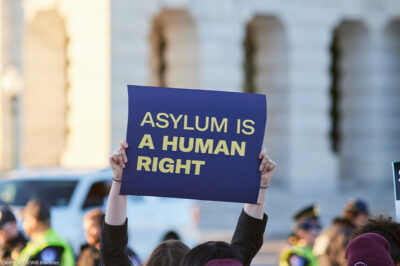
Most reports on immigration focus on Latino workers and the southwest border. However, there are many faces and backgrounds of American immigrants, and the breadth of obstacles created as a result of our broken system are far-reaching. This week the Congressional Black Caucus (“CBC”) and Howard University hosted a compelling discussion on immigration that highlighted the reasons why immigration is important to all communities, and is particularly relevant to Black Americans and all communities of the African diaspora.
The forum, entitled “Immigration Reform in Black America,” was moderated by Dr. Greg Carr, a Howard University professor of Afro-American Studies and featured three members of the CBC, Representatives Yvette Clarke (D-N.Y.), Hakeem Jeffries (D-N.Y.), and Steven Horsford (D-Nev.), along with a courageous young man, Alden I. Nesbitt, a DREAMer of Caribbean descent. The panel highlighted the unique circumstances of those who enter the country lawfully but lose status while attempting to navigate the immigration labyrinth. Representatives Clarke and Jeffries set the tone with a historical overview of the U.S. immigration laws and how the definition of who is “American” worthy of citizenship has evolved and will continue to evolve – from slavery, to women, and onward.
The panelists also focused on enlightening civil society about the 3 million black immigrants in our country, those from mixed-status families of Caribbean and African descent, as well as the first and second generation immigrants who all have a tremendous stake in this fight. The speakers discussed the national demographics of communities of color and the unreasonable mass incarceration of immigrants. Rep. Horsford explained his diverse constituency, his Trinidadian roots, and the need for all communities to be united to ensure that new legislation adequately addresses the concerns of the entire immigrant community. Alden spoke passionately about how the immigration conversation leaves out a group of aspiring Americans who are misinformed about the immigration process, or are made false promises that leave immigrants unjustly vulnerable to detention or deportation when they are not realized.
Alden told the story of his family’s immigration from Trinidad & Tobago. His mother, a school teacher holding a Master’s degree, was recruited to come to the U.S. and teach in the New York City Public schools. She was promised a career and a pathway to citizenship, and the same for her children. However, Alden, after 12 years in this country, middle school, high school and the start of college, on his 21st birthday, received a letter saying that he had just 90 days to leave the country that is his home. The family was confused, devastated and depressed about the news, especially when they had the understanding that all of the children were on the path to citizenship. Alden has come out of the shadows to share this rarely heard but common reality for many in the immigration struggle. Alden and his mother went on to found two organizations to combat situations like theirs, the International Youth Association and the Association of International Educators, respectively.
The CBC has done a great job of elevating a perspective that is not often captured in the news headlines and reminds us that immigration is more than a “Latino” issue, or even an immigrant issue. Instead, immigration reform is an American civil rights issue of fairness and equity. Horsford closed saying “We are close but we cannot accept just anything; the reform legislation must address all immigrants’ concerns. We urge all communities to be active.”
Learn more about immigration reform and other civil liberty issues: Sign up for breaking news alerts, follow us on Twitter, and like us on Facebook.




